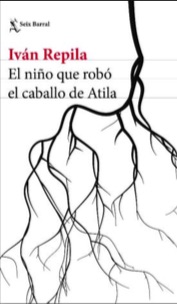*本书有全英语书稿
“Human desperation vs the necessity of hope, told via fairytale, this is big picture writing at it’s most imaginative and unpredictable.”
一对兄弟,大与小,被困在水井底。这下面又冷又湿,两个孩子没有任何食物,也没有任何被拯救的可能。他们没有任何方式逃脱出这个水井。小想破头脑也想不出办法,慢慢地开始序曲理智。在这时,大想到了一个疯狂的办法来解救小。是谁把他们丢到水井里?为什么?两兄弟在水井里的状况大大不同:小越来越病弱、大不停地运动以及进食。
这是一个寓言故事,探讨了人类最绝望的时候会被逼出什么,以及人类无止尽的希望故事的第一句话完全地总结了整本书的核心:“It looks impossible to get out, he says. And also: ‘But we’ll get out。”这个故事不长、节奏很快,但是充满了隐喻与意义。人们在最绝望的时候是如何斗争、生存以及团结。
非常推荐这个书评:
https://theasylum.wordpress.com/2015/03/26/ivan-repila-the-boy-who-stole-attilas-horse/
(看不到请跟我联系,我把内文贴给你)
关于作者:
Iván Repila在1978年出生于西班牙。他曾经做过广告、平面设计以及编辑工作。他的第一本小说Despicable Comedy获得大量好评,在西班牙成为非常受喜爱的作家。这是他的第二本小说。
好评:
"Repila's first book to be translated to English is a provocative and focused parable... brief and brutal… Hughes's vibrant translation aids Repila's lyrical descriptions of anguish and hope, and the narrative's intelligence and depth make it a gripping read." — Publishers Weekly
"short, intense. . . realism is not the order of the day, but rather the distorted, disturbing exaggerations of expressionism." — The Guardian
"A story beguiling in its fairytale-like simplicity and absolute distance from any recognizable reality... With shocking precision The Boy Who Stole Attila’s Horse reveals what happens when two innocent individuals are dispossessed of everything and made to live like terrorized animals. Repila’s language, clogged with maggots and tumors, festering wounds and leaking brains, gives this book an overwhelming pungency (praise must be given to Sophie Hughes for a translation nimble enough to turn on a dime and powerful enough to knock us out with its startling images)." — BOMB Magazine
"The Boy Who Stole Attila’s Horse, Iván Repila’s second novel and his first to appear in English, is short, sharp and blackly humorous... Sophie Hughes’ translation renders it with a brutal force... The push-and-pull is essential. 'Small goes on dying for days, and his brother goes on keeping him alive. As if they were playing.' This is Repila’s game, and he’s good at it... Repila moves again into that mad, semi-religious tone, that language of icons and saints, of fire and brimstone, and in the darkness shows us the sparks of an era to come." — Full Stop Magazine
"High art, an imaginative allegorical work of breathtaking yet restrained lyric power. . . Repila’s prose is clinical, precise and beautiful. His sinuous, lilting Spanish has been magnificently rendered into English by Sophie Hughes in a faultless, rhythmic translation that enables the bleak narrative to soar like an epic poem." — Irish Times
"A fantastic first novel which made me literally plunge back into my dearest memories of childhood reading" - Librairie La Soupe de l'Espace
"Here is a story conceived to leave its mark, to be felt in the pit of one's stomach" - Librairie L'Ouvre-Boîte
"This is a masterpiece concentrated into 110 pages...This is the sort of book that you don't put down, and leaves you with a knot in your stomach" - Clara Dupont-Monod, France Inter
"Suffocation and disgust are the dominant impressions, and yet... this book is a charm... Iván Repila's language is superb, it carries with it all the spells of fairytales with their ogres, wolves and evil stepmothers, but it also manages to evoke the much less fantastical universe of camps, prisons and caves where hostages waste away" - Éric Chevillard, Le Monde
"lyrical and realistic." - Zoé Valdés
"You will emerge from it changed, grown up... an essential novel... a masterpiece" - La soupe de l'espace
"It's been a long time since I have read such an impressive book. With its rich and wise prose, combination of mannerism and enlightenment, this broken tale of what makes us tedious and atrocious is also a harsh song of love" - Tendencias 21
"A vivid novel, full of metaphors and symbols about cooperation, the effort to survive, the world's brutality, and solidarity. All things that remind us of present and universal circumstances" - Revista de letras
"A brutal, Beckett-like tale. Its end is cathartic, hopeful and violent. It is utopian, and reminds us that language is the only thing that can save us: because language is everything" - La Vanguardia
"A seemingly traditional story which works on different levels of reading. A precise novel, solid and disquieting, veiling a deep wisdom" - El País

- 偷阿提拉的马的男孩
- El niño que robó el caballo de Atila (The Boy who Stole Attila’s Horse)
- 作者:2017年9月
- 出版社代理人:Seix Barral(西班牙)
- 出版时间:2017年9月
- 页数:144页
- 已售版权:意大利、法国、美国、韩国、罗马尼亚、荷兰、希腊、日本;舞台剧改编权收到法国以及美国
- 版权联系人:tina@peonyliteraryagency.com
内容介绍


